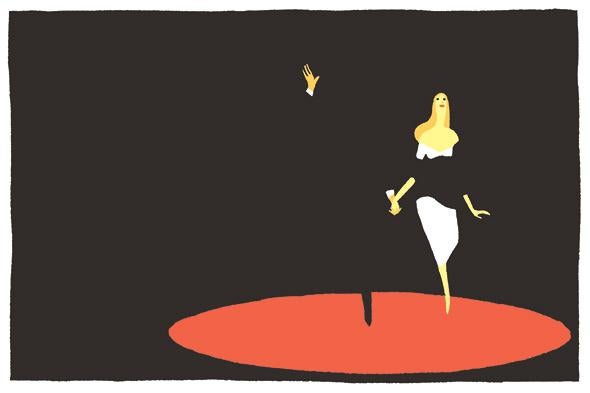“Everyone in Hollywood is disingenuous,” says Dan, a New York independent filmmaker about to encounter “Hollywood” up close and personal, in the first scene of Amy Sohn’s novel The Actress. By midway through the book, Dan’s microbudget drama will have made a splash at a Sundance-like film festival, and Dan will have become a textbook first-flush-of-success phony, but here on Page 5, still cocooned by distance and obscurity, Dan goes on to enumerate a number of the moral failings of the Hollywood “they”: “They do drugs, they cheat on their spouses, they have illegitimate children.” Not that Dan is entirely unsympathetic to these degenerate cheats and liars. Of Steven Weller, a fortysomething Tom Cruise–style star who is rumored to be gay, Dan goes on, “If I were him, I would never come out. He would lose all the macho roles. The guy wants to work.”
Hollywood not only produces illusions, it has also long operated behind at least a few layers of invention in order to allow celebrities to maintain some semblance of a private self while their images are commodified. In this industry, is it possible to live honestly without sacrificing one’s ability to make money? That’s the central question running through Sohn’s novel, which seems designed—in its intended intelectual seriousness on the one hand, and its blind-item-centric, beach-ready titillation on the other—to sit perfectly between Joan Didion’s Play It As It Lays and Jackie Collins’ Hollywood Wives.
The protagonist of The Actress is Maddy Freed, who, at the start of the novel, is both Dan’s girlfriend and the star and co-writer of I Used To Know Her, the film whose success at the fictional Mile’s End Film Festival kicks off the book.* A theater-trained unknown in her mid-20s, Maddy becomes the Brit Marling–like “it girl” of the festival, where her beauty, talent, ambition, and evident blank-slate openness to suggestion catch the eye of Steven Weller and his manager, Bridget Ostrow. Maddy is subsequently invited to join Steven and Bridget at the Berlin Film Festival, with the pretense of auditioning for the female lead in Weller’s next film. Soon after she lands the part, Maddy lands in Steven’s bed, and he proves his hetero prowess by “[making] love to her in a way that no man ever had.” Before moving into Weller’s Los Angeles manse and beginning her new life as one-half of SteMad, Maddy dumps Dan via text. She convinces herself that her longtime boyfriend brought this on himself, by letting himself be changed by the promise of success. “Maybe someday,” Maddy thinks, “he would remember who he was.”
Early in his courtship of her, Steven convinces Maddy that he’s big on self-knowledge. He tells Maddy that most actors suffer from “illeism,” meaning “they speak about themselves in the third person. People who do that are missing an ‘I.’ They don’t know who they are. I prefer people who know who they are.” In the way she presents herself to the world and also her internal monologue, Maddy’s key defining characteristic is a lack of self-awareness, a type particular to young, ambitious women, which can be easily confused for self-possession. Steven gives Maddy an instant identity as a Hollywood wife, and the fame that goes with that position has demonstrable impact on her opportunities as an actress. She feels a little guilty about all of the collateral benefit she gets from the relationship, because she really believes, at first, that all she’s giving him in return is love. The rest of the novel details how she is proved wrong.

Photo courtesy Piotr Redlinksi
During an early crisis point in her relationship with Steven, Maddy goes alone to see a revival screening of Billy Wilder’s The Apartment, in which Shirley MacLaine plays the suicidal mistress of an older man (Fred MacMurray) who strings her along with lies. Jack Lemmon plays the nebbish who loves her—and, thinking it’ll help him with his career, lends his apartment out to other men, including MacMurray, to serve as the staging area for their affairs. “One of the reasons Maddy loved The Apartment,” Sohn writes, “was that it was about a person without morality finding morality.” This kind of overly simplistic-verging-on-smug observation is representative of Maddy’s initial worldview; she’s a character who desperately needs to be called out on her B.S. but who, at work in Hollywood and in her Hollywood marriage, is allowed to hold onto delusions for way too long—in part because she is regularly condescended to or indulged but rarely challenged. (At the same time, she’s all too quick to call others out for violating her fixed idea of them; even before hooking up with Steven, she lectures Dan for contemplating taking a job that “isn’t your brand at all.”)
Maddy’s assessment of The Apartment parallels the arc of The Actress, in that the novel is, in some sense, a portrait of its protagonist’s road to consciousness. But Maddy’s journey is less about reaching moral rectitude than about learning to accept the necessity of maintaining a divided self in an industry in which doublespeak is the rule, and candor is almost always contrived. The novel begins with Maddy’s first glimpse behind a literal velvet curtain; it ends with her making a public, veiled acknowledgement that part of her job as an actress —maybe the biggest part—is maintaining an off-screen persona that supports, and never detracts from, what she does on screen.
In her acknowledgements, Sohn names Rachel Abramowitz’s excellent reported book Is That A Gun In Your Pocket? Women’s Experience of Power in Hollywood, at the top of the list of her sources. The great strength of The Actress lies in Sohn’s narrativizing of Maddy’s version of that experience, her journey from innocent to hardened veteran, as a Gaslight-style mystery. Our heroine is dropped into the cauldron of Hollywood life, her only lifeline her certainty that she knows a truth about her husband and their relationship that the gossipmongers and naysayers could never understand. Because this certainty is the underpinning of the entirety of her personal and professional lives, she holds on to it despite constant signs that she’s being duped and used. Sohn very smartly dramatizes the contradictory dictates the true-to-life industry imposes on many actresses, who are celebrated for a talent and beauty that they’re told is unique and special … and also told to lose weight, change their hair, and generally suppress anything that makes them too individual. Add to Hollywood’s enforced mutation and masking of one’s identity the fact that business as usual in this company town means the constant massaging of message, and it’s a wonder that anyone makes it through a career without going totally nuts.
Sohn has clearly done her research, but if The Actress demonstrates an analytic understanding of certain power dynamics that govern work and social life in the film industry, its world doesn’t always feel fully inhabited. There are a lot of false notes that I could isolate. For instance, I have a hard time believing that anyone in contemporary Hollywood would refer to a currently working comic actor as specializing in “Ralph Bellamy types,” or that one famous actress would bump into another famous actress, who happens to be her current husband’s ex, at the public library. (I say this as someone who frequents Los Angeles’ public libraries.) Lapses of inauthenticity like this cramp Sohn’s authority to some extent, at least when it comes to the texture of Maddy’s life as an actress. Maddy’s life as a woman is another matter: Particularly in the second half of the novel, as Maddy starts to wake up to how much of her self she’s sacrificed, only to have her attempt to reclaim her identity hampered by a difficult pregnancy, her inner life becomes fully enveloping.
Sohn works a small miracle in convincingly dragging out the novel’s central mystery—is the increasingly paranoid Maddy imagining that she’s being kept in the dark, or has she actually been roped into a conspiracy to protect Steven’s secret gay lifestyle?—deep into the back half of the book. Given everything people lie about in Hollywood, and the virtual mandate that in order to work at the highest level a performer has to live a double life, it almost seems like putting so much weight on the question of sexuality is a cop-out. At times throughout The Actress, gayness is evoked as a boogeyman that could make or break Maddy and Steven’s relationship, and this threatens to diminish Sohn’s real accomplishment in bringing to life Maddy’s experience as symbolic of the damage done by the many nebulous forces eating away at an average actress’s identity.
That said, in the book’s excellent second-to-last set piece, Sohn uses the public question of Steven’s sexuality as the catalyst for biting commentary on a working morality much more complicated than the binary scale cited in Maddy’s review of The Apartment. In this scene, set at the academy awards, Sohn posits that what can seem to outsiders like a monolithic, untouchable Hollywood establishment is in fact a rather fragile, delicately interwoven network of managed perceptions, in which one person’s coming clean can cause a chain reaction that could lead to another star’s downfall. Within this skewed system, maintaining a charade could become an act of kindness; the selfish thing to do could be to tell the truth.
The Oscar Night set-piece is successful, even moving, in part because it teases, and then dismisses, a utopian possibility for fighting back against Hollywood’s systematic manipulation of the identities of its workers. In the end, Sohn takes Maddy down a much more realistic route toward self-actualization. Its depiction of the movie industry and the people who populate it can be simplistic, occasionally laughably so, but in its insistence on taking a woman’s fight for agency within the film industry seriously, The Actress is nonetheless a valuable contribution to the canon of Hollywood fiction—a canon which is actually, incredibly, more sorely lacking strong female points of view than even Hollywood movies.
Correction, July 8, 2014: This review originally misstated the name of the novel’s fictional film festival. It is the Mile’s End Film Festival, not the Mile End Film Festival. (Return.)
—
The Actress by Amy Sohn. Simon & Schuster.
See all the pieces in this month’s Slate Book Review.
Sign up for the Slate Book Review monthly newsletter.
